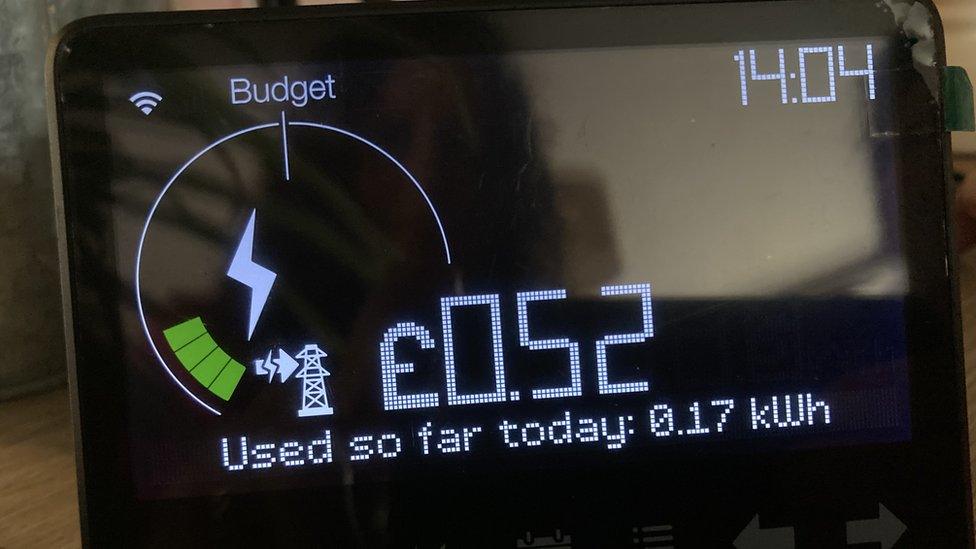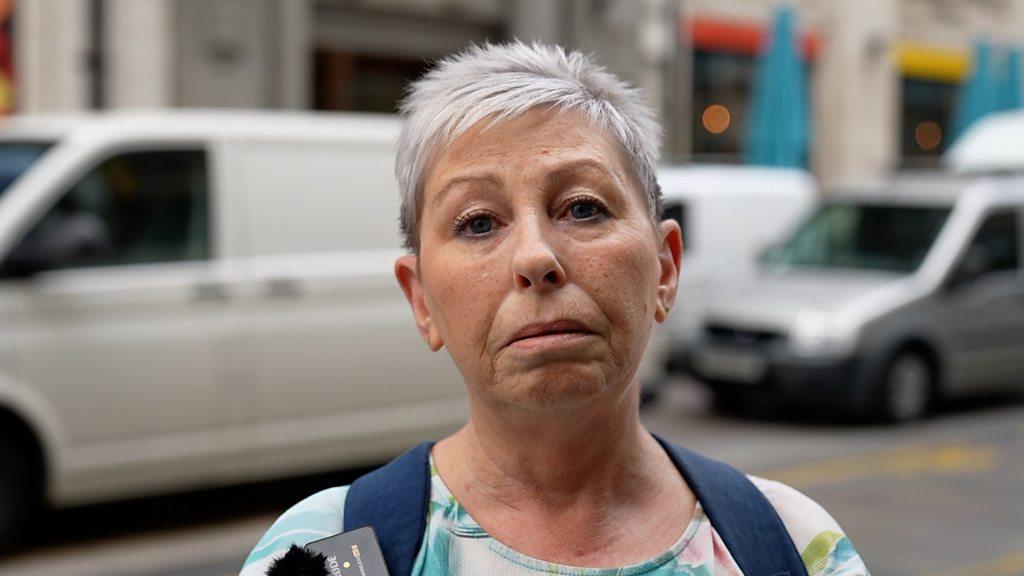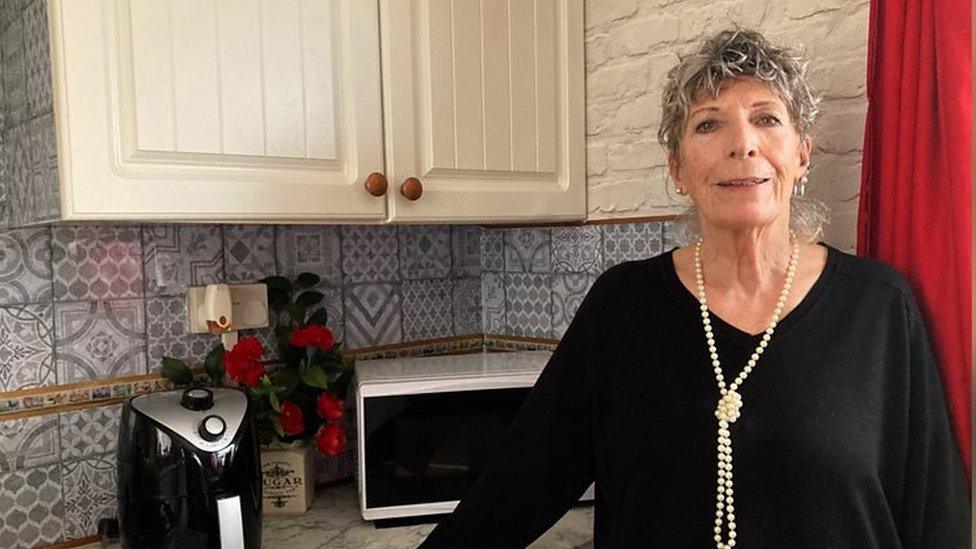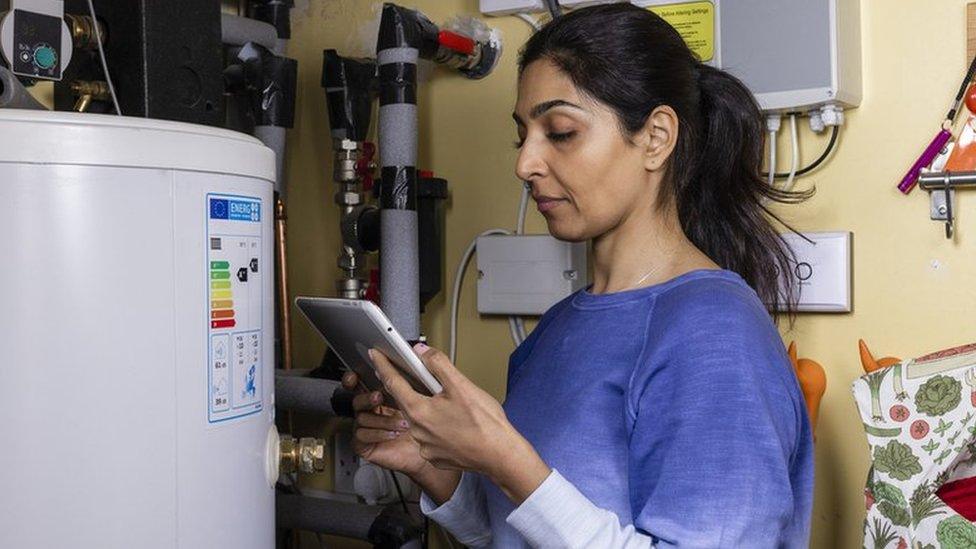Energy price cap: Families in 'damp homes' as prices rise
- Published
Sarah Drew has started cooking all her meals in the microwave to save on energy costs
"Urgent" energy efficiency upgrades are needed to homes as people are forced to make devastating choices amid soaring bills, a charity has said.
Wales has among the least energy-efficient housing in western Europe, making them more expensive to heat.
National Energy Action Cymru (NEAC) said some people were already turning off their gas and electricity.
Energy regulator Ofgem has announced the price cap for an average household will rise to £3,549 a year in October.
The Welsh government said it was looking at several measures to increase the energy efficiency of homes.
Ben Saltmarsh of NEAC said: "This is very very serious, if not devastating."
He warned some were already "going without supply entirely, turning things off, living in cold, damp houses, putting children to sleep against walls covered in black mould".
The cost of using energy has been rising at levels not seen before. In October 2021 the Ofgem-set price cap for domestic bills was £1,277 a year - one year on this has almost tripled.
"At my age I should be enjoying my life, the years I've got left, but I'm not, it's a struggle"
Sarah Drew, from Morriston, Swansea, is dependent on her state pension and has stopped using her oven and stove to try to cut costs.
Ms Drew now only cooks in her microwave and air fryer, cooking the ingredients separately before combining them into a meal - using a fraction of energy.
Allow X content?
This article contains content provided by X. We ask for your permission before anything is loaded, as they may be using cookies and other technologies. You may want to read X’s cookie policy, external and privacy policy, external before accepting. To view this content choose ‘accept and continue’.
After the last increase in energy prices Ms Drew said she "had a fit, I couldn't believe it" and took out a loan to pay for solar panels on the roof of her terraced home.
She said the payments on the loan were cheaper than her energy bills, even before October's rise.
"I would have sunk without trace, I'm glad I've done it," she said.
"With the solar panels I have, I can use my free power."
Dom and Charlene Lijertwood have a smart meter under the TV to show them how much electricity they use
Dom and Charlene Lijertwood live in Marshfield, near Newport, and have resorted to setting their two young children's nightlights on timers to save on energy costs.
They have also turned down the temperature of water in their boiler, only wash clothes at 30C and have their smart meter positioned under the TV to remind them how much electricity they are using.
Ms Lijertwood, a full-time school receptionist, now has a second job in a pub and Mr Lijertwood, a firefighter, has taken extra shifts to make more money.

The Lijertwoods have placed their smart meter below their TV
"We are not a family that is struggling at the moment but we are concerned and worried about what is for the future," said Ms Lijertwood.
"By taking on extra work we are actually managing but we are not able to save or do anything more, just managing, and that's all we can do at the moment."
'Vicious cycle'
Misty Ardouin, who runs Nestlings' Nursery in Cardiff, said she's seeing parents use less childcare due to rising costs.
"It's terrifying not knowing where it's going. There's a knock-on effect for everything, we have to put our prices up but we don't want to charge parents more because these prices going up in all areas of their lives," she said.
"It's a vicious circle because they need to work, so they need childcare."
Ms Ardouin said the nursery has already had to rise their prices twice this year to keep up with rising costs, something they would "never usually do".
"We'll have to reassess it in January, and it might go up again," she added.
While the price of energy has rocketed, the cost of installing solar panels on homes has fallen by 60% in the past 10 years.
The industry body representing the sector said the amount of solar for a small to medium house, up to nine panels, from an accredited installer costs about £4,400.

SHORT FILMS FROM WALES: Made by up-and-coming Welsh film-makers

Almost half in fuel poverty
Welsh government figures suggest about 45% of households are already in fuel poverty, with researchers from the University of York forecasting that will rise to 68.7% when January's price cap rise comes into force.
Minister for social justice Jane Hutt said: "It's terrifying what is happening now and the lack of action by the UK government."
She said minister in Westminster should bring back a £20 a week top up for families on universal credit, as happened during the pandemic and back Labour leader Kier Starmer's call for a freeze of oil and gas prices.
The Department for Business, Energy and Industrial Strategy said: "We are giving a £400 discount on energy bills this winter and eight million of the most vulnerable households will see £1,200 extra support."
Mr Saltmarsh said the Welsh government needed to do more to help insulate homes so people do not need to use as much expensive energy to keep warm.
The Welsh government said there were several initiatives to boost the energy efficiency of homes.
A spokesman said this included the "flagship Optimised Retrofit Programme, external" for social housing, which allowed people to find out how to lower their carbon footprint.
He added: "The Welsh Quality Housing Standard, which was introduced in 2002, has required landlords to improve the energy efficiency of their homes and 99% of the social housing stock has achieved the standard."
- Published26 August 2022

- Published26 August 2022

- Published24 August 2022

- Published22 August 2022

- Published22 September 2022
